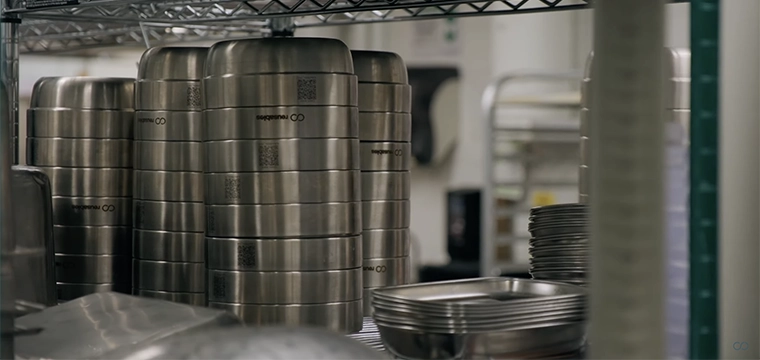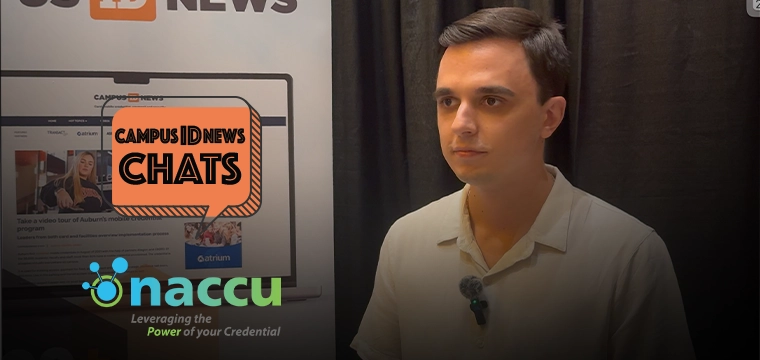
Students tap a card or mobile credential to use RFID-tagged to go containers
This week, Transact announced a new partnership with Reusables, a platform that enables students to check out and return reusable containers using their campus cards or mobile credentials. The integration between the two companies requires no additional app downloads, allowing students to easily and quickly begin using the system.
Reusables is a Vancouver-based company dedicated to the elimination of single-use plastics, like the ones used in take-out food orders in campus dining facilities.
The use of the product is simple. At participating Transact client institutions, students tap their card or mobile credential at a dedicated reader to obtain a container from a smart bin or food service worker. They tap their ID again when they are ready to return the product at a designated drop-off location.
Students tap their card or mobile credential at a Transact MRD5 reader to obtain a container from a smart bin or food service worker.
Transact’s MRD5 reader facilitates the transaction. It is a portable device that can be used in both wired and non-connected environments.
Used containers are retrieved by dining services for cleaning using an existing commercial dishwasher. Onsite cleaning further benefits the environment by eliminating emissions caused by transporting containers for offsite cleaning.
Reusables is container agnostic, so the campus decides if they prefer plastic or stainless steel options.
This company notes that because stainless steel containers have a perceived value above plastics, they have helped institutions achieve extremely high return rates on containers. Additionally, stainless items can last up to 1,000 uses.
“Our partnership with Transact will help make reuse more seamless for students and staff, giving them an easy way to contribute to eliminating single-use packaging waste and the downstream negative effects,” said Jason Hawkins, co-founder and CEO of Reusables. “We find that removing the barriers allows our clients to achieve high adoption and return rates of 99%.”
Containers are tracked with RFID tags to assist with the return and enable reporting on the environmental impact of the program.
The system runs on the notion that students will return the containers when they are done, incurring no cost, which incentivizes the use of the product.
Containers are tracked using attached RFID tags to assist with the return of products once finished. This tracking technology also allows Reusables to create reports based on the environmental impact of the continued use of the containers.
The rate of production and use of plastic, especially plastics that are only designed to be used one time, harbors issues of biodiversity and climate change.
“Partnering with Reusables allows us to further enhance the student experience by integrating sustainable solutions directly into campus life,” said Chris Setcos, SVP of partnerships and M&A at Transact. “This collaboration not only strengthens our environmental commitments, but also reflects our dedication to maintaining an open ecosystem of partners across all functional areas of our business.”
The initial implementation of the partnership is underway at Pomona College in Claremont, California.
The reusable containers are available in a variety of shapes and sizes, for uses ranging from a cup of coffee to a power bowl. Campuses can decide which of the reusable products they want to offer on their campus depending on their individual needs.
“Our vision is to make reusable packaging the default for food services globally,” Hawkins said. “We want to make reuse completely frictionless and traceable so we can move away from plastic forever.”




